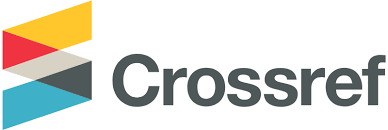RELASI DENGAN TEMAN, MODE KOMUNIKASI, DAN SUBJECTIVE WELL- BEING ANAK DAN REMAJA PADA TAHUN KEDUA PANDEMI COVID-19
Abstrak
Pandemi COVID-19 telah memasuki tahun kedua dan membatasi relasi sosial anak dan remaja dengan teman- temannya. Penelitian ini bertujuan menguji persepsi anak dan remaja mengenai relasinya dengan teman di masa pandemi terhadap subjective well-being (SWB) serta menguji mode komunikasi yang digunakan oleh anak dan remaja untuk berinteraksi dengan teman yang berperan terhadap SWB. Partisipan penelitian ini (N = 1,657; 45.1% perempuan; 54.9% laki-laki) adalah anak dan remaja usia 10-18 tahun (M = 14.85) di Jawa Barat. Pengambilan data dilakukan secara dalam jaringan (daring) menggunakan Google Form dengan teknik sampling convenience. SWB diukur menggunakan Children’s Worlds Subjective Well-Being Scale 5 items (CW-SWBS5), sedangkan persepsi mengenai relasi dengan teman diukur menggunakan alat ukur relasi dengan teman dari Children’s Worlds. Data dianalisis menggunakan regresi linear berganda dan analisis deskriptif menggunakan ANOVA. Hasil menunjukkan persepsi anak bahwa mereka memiliki teman yang cukup, teman yang biasanya baik, dan teman yang memberikan dukungan saat anak memiliki masalah, berkontribusi positif terhadap SWB anak, di mana skor SWB secara signifikan lebih tinggi dibandingkan skor SWB anak yang mempersepsi tidak memiliki cukup teman, teman biasanya tidak baik, dan teman tidak memberikan dukungan saat anak memiliki masalah. Penggunaan mode komunikasi voice call, Twitter, video call, dan Instagram yang digunakan untuk berinteraksi dengan teman pada tahun kedua pandemi dapat memprediksi SWB anak dan remaja. Guna mempertahankan tingkat SWB anak dan remaja di masa pandemi, hendaknya orang tua mengizinkan anak tetap menjalin relasi sosial dengan teman-temannya menggunakan mode komunikasi daring di masa pembatasan jarak sosial di bawah supervisi orang tua.
Kata Kunci
Teks Lengkap:
PDFReferensi
Bae, S. M. (2019). The relationship between smartphone use for communication, social capital, and subjective well-being in Korean adolescents: Verification using multiple latent growth modelling. Children and Youth Services Review, 97, 93-99. https://doi.org/10.1016/j.childyouth.2018.11.032
Bagwell, C. L., Kochel, K. P., & Schmidt, M. E. (2015). Friendship and happiness in adolescence. In M. Demir. (Eds)., Friendship and Happiness (pp. 99-116). Springer. https://doi.org/10.1007/978-94-017-9603-3_6
Borualogo, I. S., & Casas, F. (2019). Adaptation and validation of the Children’s Worlds Subjective Well-Being Scale (CW-SWBS) in Indonesia. Jurnal Psikologi, 46, 102–116. https://doi.org/10.22146/jpsi.38995
Borualogo, I. S., & Casas, F. (2021a). Children and adolescents’ report on their quality of life during the COVID-19 pandemic. Psikohumaniora, 6(2), 117-232.
Borualogo, I. S., & Casas, F. (2021b). Children’s and adolescents’ subjective well-being during the COVID-19 pandemic in Indonesia: Two data collections. [Manuscript under review]. Faculty of Psychology Universitas Islam Bandung, Doctoral Program on Education and Society, Faculty of Education and Social Science, Universidad Andrés Bello, Chile and ERIDIqv research team, University of Girona, Spain.
Borualogo, I. S., Gumilang, E., Mubarak, A., Khasanah, A. N., Wardati, M. A., Diantina, F. P., Permataputri, I., & Casas, F. (2019). Process of translation of the Children’s Worlds Subjective Well-Being Scale in Indonesia. Proceedings of the Social and Humaniora Research Symposium (SoRes 2018), 307, 180–183. https://doi.org/10.2991/sores-18.2019.42
Cheng, T. C., Kim, S., Koh, K. (2020). The impact of COVID-19 on subjective well-being: Evidence from Singapore, IZA Discussion Papers, No. 13702, Institute of Labor Economics (IZA), Bonn. https://econstor.eu/bitstream/10419/227229/1/dp13702.pdf
de Abreu, P. M. J. E., Neumann, S., Wealer, C., Abreu, N., Macedo, E. C., & Kirsch, C. (2021). Subjective well-being of adolescents in Luxembourg, Germany, and Brazil during the COVID-19 pandemic. Journal of Adolescent Health, 69(2), 211-218. https://doi.org/10.1016/j.jadohealth.2021.04.028
Diener, R., Oishi, S., & Lucas, R. E. (2015). National accounts of subjective well-being. American Psychological Association, 70(3), 234-242. https://doi.org/10.1037/a0038899
Dimmock, J., Krause, A. E., Rebar, A., & Jackson, B. (2021). Relationship between social interactions, basic psychological need, and wellbeing during the COVID-19 pandemic. Psychology and Health, https://doi.org/10.1080/08870446.2021.1921178
Ducharme, J. (2020, 11 Maret). World Health Organization declares COVID-19 a ‘pandemic’. Here’s what that means. Time. https://time.com/5791661/who-coronavirus-pandemic-declaration/
Fioravanti, G., Prostamo, A., & Casale, S. (2020). Taking a shor break from Instagram: The effects on subjective well-being. Cyberpsychology, Behavior, and Social Networking, 23(2), 107-112. https://doi.org/10.1089/cyber.2019.0400
Gandhawangi, S. (2021, 14 April). Potensi depresi dan kecemasan kian tinggi saat pandemi COVID-19. Kompas. https://kompas.id/baca/kesehatan/2021/04/14/potensi-depresi-dan-kecemasan-kian-tinggi-saat-pandemi-covid-19/
Goswami, H. (2012). Social relationships and children’s subjective well-being. Social Indicators Research, 107, 575-588. https://doi.org/10.1007/s11205-011-9864-z
Hanley, S. M., Watt, S. E., & Coventry, W. (2019). Taking a break: The effect of taking a vacation from Facebook and Instagram on subjective well-being. Plos One, 14(6), e0217743. https://doi.org/10.1371/journal.pone.0217743
Ishii, K. (2017). Online communication with strong ties and subjective well-being in Japan. Computers in Human Behavior, 66, 129-137. https://doi.org/10.1016/j.chb.2016.09.033
Khor, S., Cummins, R. A., Fuller-Tyszkiewicz, M., Capic, T., Jona, C., Olsson, C. A., Hutchinson, D. (2020). Australian Unity Wellbeing Index – Report 37: Subjective wellbeing during COVID-19. Geelong: Australian Centre on Quality of Life, School of Psychology, Deakin University. https://www.acqol.com.au/projects#reports
Kirsch, C., de Abreu, P. M. J. E., Neumann, S., Wealer, C., Brazas, K., & Hauffels, I. (2020). Subjective well-being and stay-at-home-experiences of children aged 6-16 during the first wave of the COVID-19 pandemic in Luxembourg: A report of the project COVID-Kids. University of Luxembourg. https://orbilu.uni.lu/bitstream/10993/45450/1/UNI_UNICEF_E.pdf
Marroquín, B., Vine, V., & Morgan, R. (2020). Mental health during the COVID-19 pandemic: Effects of stay-at-home policies, social distancing behavior, and social resources. Psychiatry Research, 293, 113419. https://doi.org/10.1016/j.psychres.2020.113419
Mínguez, A. M. (2020). Children’s relationships and happiness: The role of family, friends and the school in four European countries. Journal of Happiness Studies, 21, 1859-1878. https://doi.org/10.1007/s10902-019-00160-4
Mitra, R., Waygood, W.O.D., & Fullan, J. (2021). Subjective well-being of Canadian children and youth during the COVID-19 pandemic: The role of the social and physical environment and heatlthy movement behaviours. Preventive Medicine Reports, 23, 101404. https://doi.org/10.1016/j.pmedr.2021.101404
Permatasari, D. (2021, 31 Juli). Kebijakan COVID-19 dari PSBB hingga PPKM empat level. Kompaspedia. https://kompaspedia.kompas.id/baca/infografik/kronologi/kebijakan-covid-19-dari-psbb-hingga-ppkm-empat-level
Prasetyani, Y. M., & Widiarini, A. D. (2021, 4 April). Internet sudah jadi napas baru kehidupan di tengah pandemi. Kompas.com. https://nasional.kompas.com/read/2021/04/04/09020061/internet-sudah-jadi-napas-baru-kehidupan-di-tengah-pandemi
Purwanto, A. (2021, 23 Agustus). Ekonomi dunia di masa pandemi COVID-19: Dari dampak hingga proyeksi pertumbuhan 2021-2022. Kompaspedia. https://kompaspedia.kompas.id/baca/paparan-topik/ekonomi-dunia-di-masa-pandemi-covid-19-dari-dampak-hingga-proyeksi-pertumbuhan-2021-2022
Rees, G. (2018). The association of childhood factors with children’s subjective well-being and emotional and behavioural difficulties at 11 years old. Child Indicators Research, 11, 1107-1129. https://doi.org/10.1007/s12187-017-9479-2
Rees, G., Savahl, S., Lee, B. J., & Casas, F. (Eds.). (2020). Children’s view on their lives and well-being in 35 countries: A report on the Children’s Worlds project, 2016-19. Children’s Worlds Project (ISCWeB). https://isciweb.org/wp-content/uploads/2020/07/Childrens-Worlds-Comparative-Report-2020.pdf
Savahl, S., Adams, S., Florence, M., Casas, F., Mpilo, M., Isobell, D., & Manuel, D. (2020). The relation between children’s participation in daily activities, their engagement with family and friends, and subjective well-being. Child Indicators Research, 13, 1283-1312. https://doi.org/10.1007/s12187-019-09699-3
Savahl, S., Casas, F., & Adam, S. (2021). The structure of children’s subjective well-being. Frontiers in Psychology. https://doi.org/10.3389/fpsyg.2021.650691
Vally, Z., & D’Souza, C. G. (2019). Abstinence from social media use, subjective well-being, stress, and loneliness. Perspectives in Psychiatric Care, 55(4), 752-759. https://doi.org/10.1111/ppc.12431
Wantiknas (n.d.). Akses digital meningkat selama pandemi. Wantiknas (Dewan Teknologo Indormasi dan Komunikasi Nasional). https://www.wantiknas.go.id/id/berita/akses-digital-meningkat-selama-pademi
WHO. (2021). Update on coronavirus disease in Indonesia. WHO. https://who.int/indonesia/news/novel-coronavirus
DOI: https://doi.org/10.24198/jpsp.v5i3.36191
Refbacks
- Saat ini tidak ada refbacks.
##submission.copyrightStatement##
##submission.license.cc.by-sa4.footer##
Jurnal ini terideks di:













